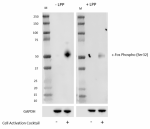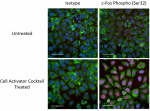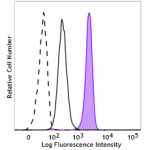- Clone
- A22009C (See other available formats)
- Regulatory Status
- RUO
- Other Names
- G0S7, p55, cFos, c-Fos, Proto-oncogene, Transcription Factor subunit, AP-1
- Isotype
- Mouse IgG2b, κ
- Ave. Rating
- Submit a Review
- Product Citations
- publications

-

HeLa cells untreated (negative control, open histogram), or treated with Cell Activation Cocktail (without Brefeldin A) (Cat. No. 423301) (positive control, filled histogram) were fixed and permeabilized using the True-Phos™ Perm Buffer Set (Cat. No. 425401) and intracellularly stained with PE anti-c-Fos Phospho (Ser32) (clone A22009C) or PE mouse IgG2b, κ isotype control (open histogram, dashed line) (representative histogram for either untreated or treated cells) (Cat. No. 400311). -

HeLa cells treated with Cell Activation Cocktail (without Brefeldin A) (Cat. No. 423301) were fixed and permeabilized using the True-Phos™ Perm Buffer Set (Cat. No. 425401) and then treated with (negative control, open histogram) or without Lambda phosphatase (positive control, filled histogram) followed by intracellular staining with PE anti-c-Fos Phospho (Ser32) (clone A22009C) or PE mouse IgG2b, κ isotype control (open histogram, dashed line) (representative histogram for either untreated or treated cells) (Cat. No. 400311).
| Cat # | Size | Price | Save |
|---|---|---|---|
| 631253 | 25 tests | ¥38,500 | |
| 631254 | 100 tests | ¥96,800 |
The proto-oncogene c-Fos is the human homolog of the retroviral v-Fos oncogene, and is a member of the Fos family of transcription factors. c-Fos forms heterodimers with proteins of the Jun family of transcription factors to form the Activator Protein-1 complex (AP-1). This complex is involved in critical cellular processes such as inflammation, cell proliferation, differentiation, survival, hypoxia, bone development and angiogenesis which suggests c-Fos is an important therapeutic target for cancer, vascular remodeling, acute inflammation and autoimmune diseases. In addition, increases in c-Fos expression and activation are associated with neuronal activity induced by psychoactive drugs. Expression of c-Fos is rapid and transitory, and phosphorylation at residues Ser32 and Thr232 by Erk5 increases protein stability and nuclear localization.
Product DetailsProduct Details
- Verified Reactivity
- Human
- Antibody Type
- Monoclonal
- Host Species
- Mouse
- Immunogen
- Synthetic peptide from human c-Fos phosphorylated at Ser32.
- Formulation
- Phosphate-buffered solution, pH 7.2, containing 0.09% sodium azide and BSA (origin USA)
- Preparation
- The antibody was purified by affinity chromatography and conjugated with PE under optimal conditions.
- Concentration
- Lot-specific (to obtain lot-specific concentration and expiration, please enter the lot number in our Certificate of Analysis online tool.)
- Storage & Handling
- The antibody solution should be stored undiluted between 2°C and 8°C, and protected from prolonged exposure to light. Do not freeze.
- Application
-
ICFC - Quality tested
- Recommended Usage
-
Each lot of this antibody is quality control tested by intracellular immunofluorescent staining with flow cytometric analysis. For flow cytometric staining, the suggested use of this reagent is 5 µL per million cells in 100 µL staining volume or 5 µL per 100 µL of whole blood. It is recommended that the reagent be titrated for optimal performance for each application.
- Excitation Laser
-
Blue Laser (488 nm)
Green Laser (532 nm)/Yellow-Green Laser (561 nm)
- Application Notes
-
For ICFC use we recommend cell fixation/permeabilization with True-Phos™ Perm buffer.
- RRID
-
AB_3106233 (BioLegend Cat. No. 631253)
AB_3106233 (BioLegend Cat. No. 631254)
Antigen Details
- Structure
- c-Fos is a 380 amino acid length protein. It has a leucine zipper domain that allows it to form heterodimers with members of the Jun family proteins.
- Distribution
-
Non-phosphorylated forms can be found in the endoplasmic reticulum. However, after activation/phosphorylation the protein is translocated to the nucleus.
- Function
- c-Fos is a subunit of the AP-1 transcription factor. The half-life of the protein is short; however, phosphorylation induces protein stability and translocation to the nucleus.
- Interaction
- c-Fos interacts with members of the Jun family proteins to form the AP-1 transcription factor.
- Ligand/Receptor
- As a part of the transcription factor AP-1, it binds to specific DNA sequences to regulate gene transcription
- Biology Area
- Cell Biology, Cell Proliferation and Viability, Immuno-Oncology, Immunology, Innate Immunity, Neuroscience, Transcription Factors
- Molecular Family
- Innate Immune Signaling, Phospho-Proteins, Tumor Suppressors
- Antigen References
-
- Sasaki T, et al. 2006. Mol Cell. 24:63-75.
- Huang K, et al. 2014. Cell Signal. 26:629-38.
- Qu X, et al. 2019. Cancer Sci. 110:3183-3196.
- Guo JC, et al. 2015. PLoS One. 10:e0120332.
- Rodriguez-Berdini L, et al. 2020. J Biol Chem. 295:8808-8818.
- Gene ID
- 2353 View all products for this Gene ID
- UniProt
- View information about c-Fos on UniProt.org
Related FAQs
- What type of PE do you use in your conjugates?
- We use R-PE in our conjugates.
Other Formats
View All c-Fos Phospho Reagents Request Custom Conjugation| Description | Clone | Applications |
|---|---|---|
| Purified anti-c-Fos Phospho (Ser32) | A22009C | WB,ICC,ICFC |
| PE anti-c-Fos Phospho (Ser32) | A22009C | ICFC |
| Alexa Fluor® 488 anti-c-Fos Phospho (Ser32) | A22009C | ICFC |
| Alexa Fluor® 647 anti-c-Fos Phospho (Ser32) (for Flow Cytometry) | A22009C | ICFC |
| Alexa Fluor® 647 anti-c-Fos Phospho (Ser32) (for IHC and ICC) | A22009C | IHC-P,ICC |
Compare Data Across All Formats
This data display is provided for general comparisons between formats.
Your actual data may vary due to variations in samples, target cells, instruments and their settings, staining conditions, and other factors.
If you need assistance with selecting the best format contact our expert technical support team.
-
Purified anti-c-Fos Phospho (Ser32)

Whole cell extracts (15 µg total protein) from HeLa cells un... 
HeLa cells untreated (top panels), or treated with Cell Acti... 
HeLa cells untreated (negative control, open histogram), or ... 
IHC staining of Purified anti-c-Fos Phospho (Ser32) on forma... -
PE anti-c-Fos Phospho (Ser32)

HeLa cells untreated (negative control, open histogram), or ... 
HeLa cells treated with Cell Activation Cocktail (without Br... -
Alexa Fluor® 488 anti-c-Fos Phospho (Ser32)

HeLa cells untreated (negative control, open histogram), or ... 
HeLa cells treated with Cell Activation Cocktail (without Br... -
Alexa Fluor® 647 anti-c-Fos Phospho (Ser32) (for Flow Cytometry)

HeLa cells untreated (negative control, open histogram), or ... -
Alexa Fluor® 647 anti-c-Fos Phospho (Ser32) (for IHC and ICC)

IHC staining with Alexa Fluor® 647 anti-c-Fos Phospho (Ser32... 
HeLa cells untreated or treated with Cell Activation Cocktai...












Follow Us